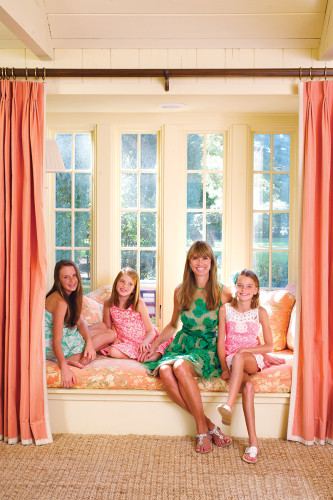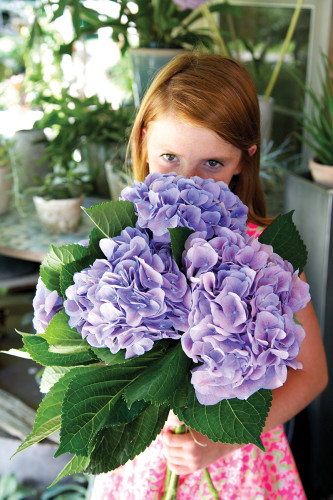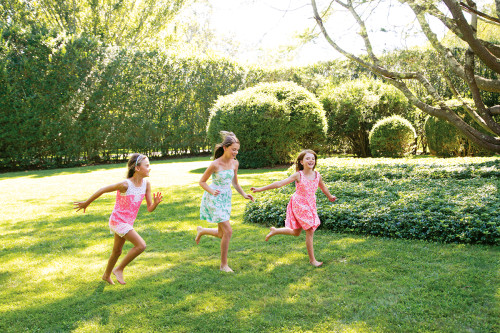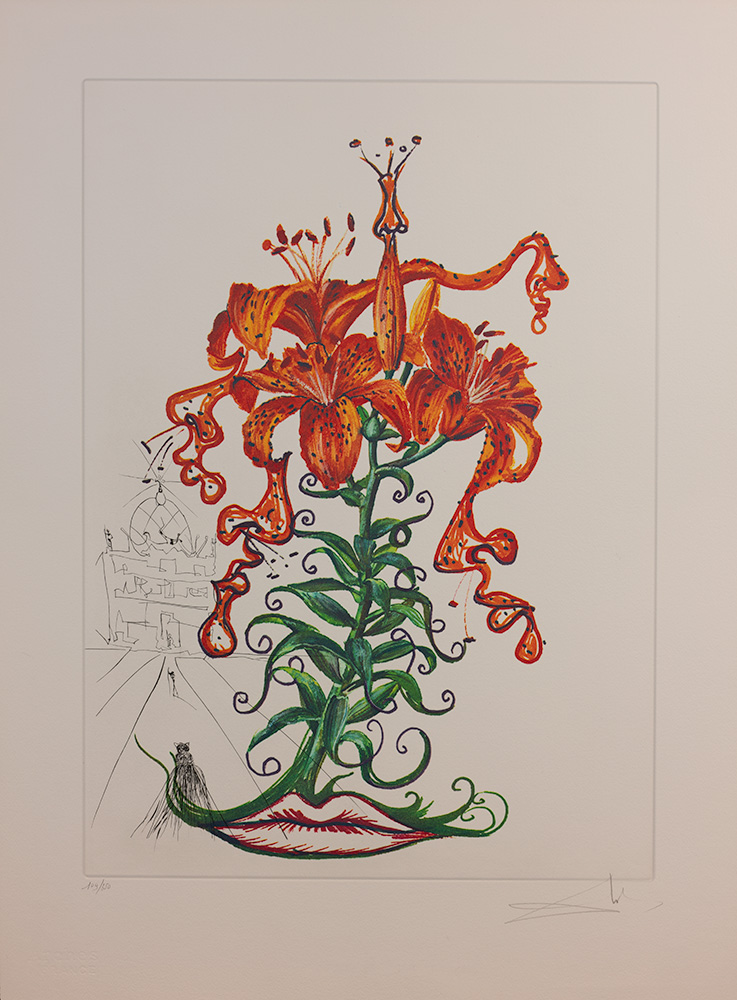
Chesie Breen and her daughters Virginia, Eliza, and Margaret Ivy pause for a Mother’s Day photograph in the living room.
It’s a glorious May Afternoon, and the Breen sisters—Virginia, Eliza, and Margaret Ivy—are busy doing what typical kids do: climbing trees, showing of their dance routines, and practicing cartwheels and balance beam moves on the lawn of their East Hampton home. That they’re still wearing their Lilly Pulitzer dresses from church this morning undoubtedly adds to the degree of difficulty, but surely amps up any judges’ marks for style. When their mother, Chesie, steps out to call them in to get ready for lunch, things start to get a little less typical. With only a minimum of eye rolling and fuss, and like sprinters set at the starting blocks, the girls race to the front door. The reward for who gets to the finish line first? The opportunity to set the table, but in this competition, everyone wins.
The eldest, Virginia, goes to the cupboard and pulls out the plates, a combination of her parents’ Haviland wedding china and salad plates that belonged to her great-grandmother. Eliza puts the finishing touches on the flowers—garden roses, hydrangeas, and veronica that fill a smattering of vases and engraved baby cups. The youngest, Margaret Ivy, sets about writing place cards that add charm and perhaps a little unexpected formality for a small family gathering.
That all three sisters will be laying the table with a mix of Tiffany silver patterns they’ve been amassing since they were born may not be the norm in every household, but for Chesie, it’s all part of her parenting philosophy: to pass on the traditions of gracious living that have influenced her ethos since her own childhood in Virginia and Texas. As she keeps a watchful eye on the bustle of activity in the dining room, she recalls, “Our house was always open, and entertaining was something that both of my parents loved to do. Now when we entertain as a family [today it’s Mother’s Day lunch for a visiting grandmother], I don’t say, ‘OK, girls, it’s time for the party.’ We all weigh in and participate, from the menu to the flowers to who will be coming.

Eliza eyes a cluster of purple hydrangeas destined for a spot on the dessert table.
Chesie hesitates for a moment, lest she leave the impression that everyday life in the Breen household is the 21st-century version of Downton Abbey. “Anything but,” she laughs. “We are not pristine. Life is what it is, and we don’t sit down in white gloves and dress for dinner every night.” Indeed, you are just as likely to find the girls shuttling back and forth from after-school swim meets, lacrosse games, or voice lessons, as engaging in party planning. “The main reason we moved to East Hampton is that it’s really just a small town, and I wanted the girls to grow up with a sense of community—but also in a place where you can be surrounded by a beautiful environment, with beaches and hiking dunes, and the things that push all of our buttons.”
The beautiful environment extends inside the rambling, 1960s house that Chesie describes as a total gut job when she and her husband, Tommy, bought it 14 years ago. She enlisted the expertise of dear friends and designers Greg Jordan and Rob Southern to create an English cottage feel, and the house now blends a casual attitude appropriate for a young family with an air of elegance that evokes the Southern sensibility both Chesie and Tommy grew up absorbing. The living room is decorated with floral chintz, but one that has been washed multiple times and quilted to give it an aged appearance. In the dining room, Gracie wallpaper printed on parchment envelops the space with a timeless pattern toned down a notch or two from its inherent sophistication.
For Chesie, an author, magazine editor, and luxury-marketing guru who represents designers such as Nina Campbell, contributes to House Beautiful, and has worked on books from the likes of Martha Stewart and Lee Bailey, the need to create style and live well is practically second nature. It is one that has been well honed throughout her professional career, but was initially sparked when she was a young child. And that’s exactly why she strives to pass the same appreciation and awareness to her own children. “What we remember becomes our traditions, and defines our upbringing,” she says. “It’s important for the girls to grow up with good manners in a way that embraces the past and some of its rituals, because I think that’s a wonderful inheritance.

“I love that my girls are a little bit rough-and-tumble and that they are really into the outdoors,” says Chesie.
She admits that her philosophy isn’t always about taking the most effortless path. “For me, quality of life is often about discipline. Would it be easier to eat on paper plates with paper napkins and throw everything away? Sure,” she says. “But I think graciousness of living is about making that extra effort when it might be easier to do something else. Having fresh flowers in the house, or spreading into the dining room on a weeknight and pulling out the linen placemats and lighting candles because we’ve gone to a bit of trouble to make a good meal makes a relatively ordinary happening important.”
Thus, preparations like the one for today’s Mother’s Day lunch are anything but a once-or- twice-a-year occurrence for the girls, and they know the drill, needing only an occasional gentle reminder of which fork goes where on the table. Whether it’s one of their birthdays, recognition of an award at school, or even sometimes “just because,” they share turns picking the menu and setting the table with their respective silver patterns (collections that began with a christening gift to Virginia from the now deceased Jordan). “It’s about acknowledging them, but also a way of recognizing and being grateful for all that we have,” says Chesie. “Hopefully when they’re on their own, they’ll remember that fine things shouldn’t just sit in a drawer, but rather be used and loved.”
By Karen Carroll | Photography by Brooke Slezak



